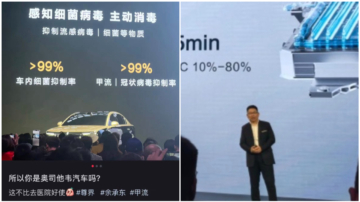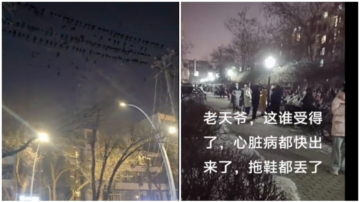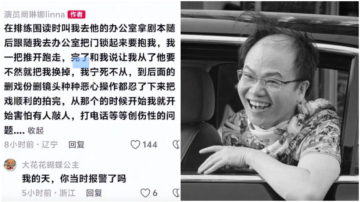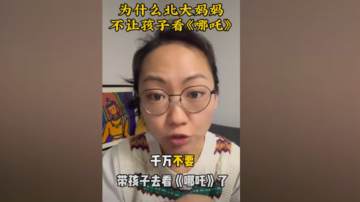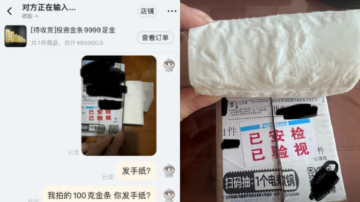【新唐人2014年03月20日讯】一叶落而知天下秋。在中国房地产大亨纷纷走向海外的脚步声中,浙江一家知名的房地产公司日前轰然倒塌。官方公布它的总负债是35亿元,企业法人等已经被当局以所谓的“涉嫌非法吸收公众存款罪”锒铛入狱。中国建商的生存与发展环境到底出了甚么问题?让我们听听专家的分析。
浙江“兴润置业投资有限公司”,是当地的龙头房企,已获国家房地产开发壹级资质,在宁波奉化开发了多个楼盘,曾名列宁波百强企业第33位、建筑房企的前5位。
据报导,“浙江兴润置业”总负债为35亿多元,企业资产有27亿到30亿元,实际亏空5亿到8亿元。目前,企业法人代表沈明崇和实际控制人——沈明崇父亲沈财兴,因“涉嫌非法吸收公众存款罪”,11号已经被移送奉化市检察院。报导说,有证据证实公司非法吸收公众存款7亿多元,借款利息基本为年利率18%到36%不等。
着名经济学者、天则经济研究所所长茅于轼:“我觉得非法集资这个罪不能成立的。非法集资这个罪是一个恶法,错误的法律。你国家银行集资就合法,别人集资就不合法?集资不一定做坏事,也可能做好事。集资就是说等于犯罪,这完全是错了,把它看成是犯罪,那就完全错了。”
近年来,中国房地产大亨们纷纷投资海外。中国最大的住宅类商品房公司——万科集团,几十年以来一直未踏出国门,现在也在新加坡和美国发展业务。董事长王石曾说,下一目标将是英国。另一位房地产巨头——大连万达集团,正在英国伦敦的泰晤士河南岸建造一座综合型酒店。
《中国事务》总编伍凡:“他们危机更大,他们赶快逃跑。因为他们做生意做的这么大,一定和官方有勾结和联结。如果和官方关系不好,根本做不起这个生意。遇到这样的危机的时候,你要么就找政治上来保护,非常大的政治上的保护,要嘛你就赶快逃跑。不逃跑,你就成了诈骗犯了。这就是共产党底下的制度造成这批商人两重命运。”
全美地产经纪商协会(National Association of Realtors)的一项调查显示,2012年,中国人已成为美国住宅市场第二大海外购买群体,占美国住宅对外销量的11%,大大高于2007年的5%。
美国中文杂志《中国事务》总编辑伍凡认为,这些中国的房地产大亨们是因为看清了北京当局对他们的利用,所以加紧海逃。
伍凡:“共产党永远在利用这些民间资本家替他们赚钱。房地产利润,包括土地价格,包括房子的税收价格等等,70%的利润给政府拿去了。开发商拿到15%到20%,就算命大了。当你做不到这一点,它就倒过来吃你。”
对于“兴润置业”,地方当局认为公司资不抵债是因为“经营管理混乱”。但公司内部人士对媒体表示﹕“政府也有脱不开的责任”。因为前几年楼市好的时候,政府把地价定得很高,企业只能高价拿地。现在楼市状况不好,政府为卖掉相邻地段,又把地价定得很低,造成了原先高价购地的公司卖不出房子,最终资金链断裂。
伍凡:“房子卖不出去,资金压在那里,还要付利息,你资金周转不过来,那么这就出现35亿的资金断裂负债。过去所借的钱,你还不出来,我就关你的门,抄你的家,抓你了。你就变成甚么?诈骗犯。它只有这样打,才能维持他们这些政权。”
伍凡认为,“兴润置业”破产绝不是一个个例,而是中国房地产泡沫破裂中的冰山一角。
茅于轼:“房地产泡沫是要破灭的,这个是必然的结果,没有办法避免的,但不知道甚么时候破。空房这么多,你让空房都住上人,就消化掉了,要把它消化掉,就不破裂了。”
目前,宁波当地政府希望有企业接盘,不要让“兴润置业”的楼宇成为烂尾楼。如果成为烂尾楼,受影响最大的恐怕是那些购买了在建楼盘的老百姓们,他们将血本无归。
采访编辑/唐音 后制/陈建铭
Tycoon Realtor Bankrupt with 3.5 Billion Yuan Debt
Is it a sign?
While many Chinese real estate tycoons fled abroad,
a prominent Zhejiang real estate developer collapsed.
With an official debt of $ 3.5 billion yuan ($625 million),
its largest shareholder was detained on charges of
'Illegally absorbing public deposits'.
What happened to the real estate developers in China?
Let's hear what the experts have to say.
Zhejiang Xingyun Real Estate Company is a local leading
enterprise.
It was certified as the state level real estate developer, and named
the 33rd among the top 100 businesses in Ningbo and the 5th in
real estate companies.
Accordingly, Zhejiang Xingrun Realty, in debt of 3.5 billion yuan,
with a corporate asset between 2.7 to 3.0 billion yuan, had a
deficit of 0.5 to 0.8 billion yuan.
The corporate owners Shen Mingchong and Shen's father
Shen Caixing were transferred to Fenghua City Procuratorate
on charges of 'Illegally absorbing public deposits' on the 11th.
It was reported that the company had illegally absorbed more
than 700 million yuan of public deposits with loan interests of
18% to 36 % per annum.
Mao Yushi, economist and Director of Unirule Institute of
Economics: "I don't think the crime of illegally absorbing public
deposits can be established.
This 'illegally absorbing public deposits criminal law' is in fact a
draconian law.
So, it is legal for the state banks to absorb public deposits, but
illegal for others?
Collecting funds could be for the good.
It is totally wrong to consider fund-collecting as a crime."
In recent years, many Chinese real estate tycoons have invested
overseas.
China's largest residential real estate company, Vanke Group,
started to invest in Singapore and the United States after decades
of development inside China.
The Chairman Wang Shi said the next target will be the United
Kingdom.
Another real estate giant, Dalian Wanda Group, is building a
comprehensive hotel project on the south bank of the River
Thames in London.
Chris Wu, China affairs magazine editor-in-chief: "Their business
can be this large because of the connections and collusion with
the authorities.
They can't afford it if they have a poor relationship with the
government.
Under a crisis, they will either need political protection or
escape as soon as possible. Otherwise, they'll be classified a swindler.
That's the fate of these businessmen under the Communist regime."
A survey of the National Association of Realtors showed that in
2012,
the Chinese have become the second-largest purchasing group in
the U.S. residential market, accounting for 11 % of overseas sales
of the U.S. residential market,
much higher than the 5% in 2007.
China affairs magazine editor-in-chief Chris Wu analyzes that
these Chinese real estate tycoons have escaped because they
stayed clear of the manipulation of the Beijing government.
Chris Wu: "It is using these private capitalists to make money.
The profits from the real estate, including the taxes, are absorbed
by the government at 70 %.
The realtors should feel lucky if they can get 15% to 20% of the
profits.
When you can't make that much, it will turn around and bite you."
Local authorities claimed that Xingyun Realty can not repay its
debt because of poor management.
However, company staff complained to the media:
"The Government also has the responsibility."
Years ago when the market was good, the government set a very
high premium for the land, the companies had to pay high to
develop the land.
Now, the government sells nearby land at low prices due to the
bad economy,
which has thus caused the formerly high-priced real estates tumble
in value, and finally break the financial chain.
Chris Wu: "There is no selling, the investment returns are zero,
but there's still interest on loans that needs to be paid.
The lack of cash-flow will surely result in the 3.5 billion capital
fracture and debt.
Not being able to pay the loan, the government will raid your
home and arrest you on the charge of being a swindler.
That is how the regime maintains its ruling."
Chris Wu believes that Xingyun Realty is by no means an
isolated case, but rather the tip of the iceberg in the Chinese
real estate bubble burst.
Mao Yushi: "The real estate bubble burst is inevitable.
The question is when.
There are so many vacant buildings in China.
If they are all occupied, then it won't go burst."
Currently, the Ningbo local government is hoping for some
enterprise to take over the construction
of the Xingyun real estate,
otherwise, its many buildings will not be unfinished.
The biggest victims will be the people who paid the premium
to purchased the buildings if they become unfinished projects.
Interview & Edit/Tang Yin Post-Production/Chen Jianming
浙江“兴润置业投资有限公司”,是当地的龙头房企,已获国家房地产开发壹级资质,在宁波奉化开发了多个楼盘,曾名列宁波百强企业第33位、建筑房企的前5位。
据报导,“浙江兴润置业”总负债为35亿多元,企业资产有27亿到30亿元,实际亏空5亿到8亿元。目前,企业法人代表沈明崇和实际控制人——沈明崇父亲沈财兴,因“涉嫌非法吸收公众存款罪”,11号已经被移送奉化市检察院。报导说,有证据证实公司非法吸收公众存款7亿多元,借款利息基本为年利率18%到36%不等。
着名经济学者、天则经济研究所所长茅于轼:“我觉得非法集资这个罪不能成立的。非法集资这个罪是一个恶法,错误的法律。你国家银行集资就合法,别人集资就不合法?集资不一定做坏事,也可能做好事。集资就是说等于犯罪,这完全是错了,把它看成是犯罪,那就完全错了。”
近年来,中国房地产大亨们纷纷投资海外。中国最大的住宅类商品房公司——万科集团,几十年以来一直未踏出国门,现在也在新加坡和美国发展业务。董事长王石曾说,下一目标将是英国。另一位房地产巨头——大连万达集团,正在英国伦敦的泰晤士河南岸建造一座综合型酒店。
《中国事务》总编伍凡:“他们危机更大,他们赶快逃跑。因为他们做生意做的这么大,一定和官方有勾结和联结。如果和官方关系不好,根本做不起这个生意。遇到这样的危机的时候,你要么就找政治上来保护,非常大的政治上的保护,要嘛你就赶快逃跑。不逃跑,你就成了诈骗犯了。这就是共产党底下的制度造成这批商人两重命运。”
全美地产经纪商协会(National Association of Realtors)的一项调查显示,2012年,中国人已成为美国住宅市场第二大海外购买群体,占美国住宅对外销量的11%,大大高于2007年的5%。
美国中文杂志《中国事务》总编辑伍凡认为,这些中国的房地产大亨们是因为看清了北京当局对他们的利用,所以加紧海逃。
伍凡:“共产党永远在利用这些民间资本家替他们赚钱。房地产利润,包括土地价格,包括房子的税收价格等等,70%的利润给政府拿去了。开发商拿到15%到20%,就算命大了。当你做不到这一点,它就倒过来吃你。”
对于“兴润置业”,地方当局认为公司资不抵债是因为“经营管理混乱”。但公司内部人士对媒体表示﹕“政府也有脱不开的责任”。因为前几年楼市好的时候,政府把地价定得很高,企业只能高价拿地。现在楼市状况不好,政府为卖掉相邻地段,又把地价定得很低,造成了原先高价购地的公司卖不出房子,最终资金链断裂。
伍凡:“房子卖不出去,资金压在那里,还要付利息,你资金周转不过来,那么这就出现35亿的资金断裂负债。过去所借的钱,你还不出来,我就关你的门,抄你的家,抓你了。你就变成甚么?诈骗犯。它只有这样打,才能维持他们这些政权。”
伍凡认为,“兴润置业”破产绝不是一个个例,而是中国房地产泡沫破裂中的冰山一角。
茅于轼:“房地产泡沫是要破灭的,这个是必然的结果,没有办法避免的,但不知道甚么时候破。空房这么多,你让空房都住上人,就消化掉了,要把它消化掉,就不破裂了。”
目前,宁波当地政府希望有企业接盘,不要让“兴润置业”的楼宇成为烂尾楼。如果成为烂尾楼,受影响最大的恐怕是那些购买了在建楼盘的老百姓们,他们将血本无归。
采访编辑/唐音 后制/陈建铭
Tycoon Realtor Bankrupt with 3.5 Billion Yuan Debt
Is it a sign?
While many Chinese real estate tycoons fled abroad,
a prominent Zhejiang real estate developer collapsed.
With an official debt of $ 3.5 billion yuan ($625 million),
its largest shareholder was detained on charges of
'Illegally absorbing public deposits'.
What happened to the real estate developers in China?
Let's hear what the experts have to say.
Zhejiang Xingyun Real Estate Company is a local leading
enterprise.
It was certified as the state level real estate developer, and named
the 33rd among the top 100 businesses in Ningbo and the 5th in
real estate companies.
Accordingly, Zhejiang Xingrun Realty, in debt of 3.5 billion yuan,
with a corporate asset between 2.7 to 3.0 billion yuan, had a
deficit of 0.5 to 0.8 billion yuan.
The corporate owners Shen Mingchong and Shen's father
Shen Caixing were transferred to Fenghua City Procuratorate
on charges of 'Illegally absorbing public deposits' on the 11th.
It was reported that the company had illegally absorbed more
than 700 million yuan of public deposits with loan interests of
18% to 36 % per annum.
Mao Yushi, economist and Director of Unirule Institute of
Economics: "I don't think the crime of illegally absorbing public
deposits can be established.
This 'illegally absorbing public deposits criminal law' is in fact a
draconian law.
So, it is legal for the state banks to absorb public deposits, but
illegal for others?
Collecting funds could be for the good.
It is totally wrong to consider fund-collecting as a crime."
In recent years, many Chinese real estate tycoons have invested
overseas.
China's largest residential real estate company, Vanke Group,
started to invest in Singapore and the United States after decades
of development inside China.
The Chairman Wang Shi said the next target will be the United
Kingdom.
Another real estate giant, Dalian Wanda Group, is building a
comprehensive hotel project on the south bank of the River
Thames in London.
Chris Wu, China affairs magazine editor-in-chief: "Their business
can be this large because of the connections and collusion with
the authorities.
They can't afford it if they have a poor relationship with the
government.
Under a crisis, they will either need political protection or
escape as soon as possible. Otherwise, they'll be classified a swindler.
That's the fate of these businessmen under the Communist regime."
A survey of the National Association of Realtors showed that in
2012,
the Chinese have become the second-largest purchasing group in
the U.S. residential market, accounting for 11 % of overseas sales
of the U.S. residential market,
much higher than the 5% in 2007.
China affairs magazine editor-in-chief Chris Wu analyzes that
these Chinese real estate tycoons have escaped because they
stayed clear of the manipulation of the Beijing government.
Chris Wu: "It is using these private capitalists to make money.
The profits from the real estate, including the taxes, are absorbed
by the government at 70 %.
The realtors should feel lucky if they can get 15% to 20% of the
profits.
When you can't make that much, it will turn around and bite you."
Local authorities claimed that Xingyun Realty can not repay its
debt because of poor management.
However, company staff complained to the media:
"The Government also has the responsibility."
Years ago when the market was good, the government set a very
high premium for the land, the companies had to pay high to
develop the land.
Now, the government sells nearby land at low prices due to the
bad economy,
which has thus caused the formerly high-priced real estates tumble
in value, and finally break the financial chain.
Chris Wu: "There is no selling, the investment returns are zero,
but there's still interest on loans that needs to be paid.
The lack of cash-flow will surely result in the 3.5 billion capital
fracture and debt.
Not being able to pay the loan, the government will raid your
home and arrest you on the charge of being a swindler.
That is how the regime maintains its ruling."
Chris Wu believes that Xingyun Realty is by no means an
isolated case, but rather the tip of the iceberg in the Chinese
real estate bubble burst.
Mao Yushi: "The real estate bubble burst is inevitable.
The question is when.
There are so many vacant buildings in China.
If they are all occupied, then it won't go burst."
Currently, the Ningbo local government is hoping for some
enterprise to take over the construction
of the Xingyun real estate,
otherwise, its many buildings will not be unfinished.
The biggest victims will be the people who paid the premium
to purchased the buildings if they become unfinished projects.
Interview & Edit/Tang Yin Post-Production/Chen Jianming

